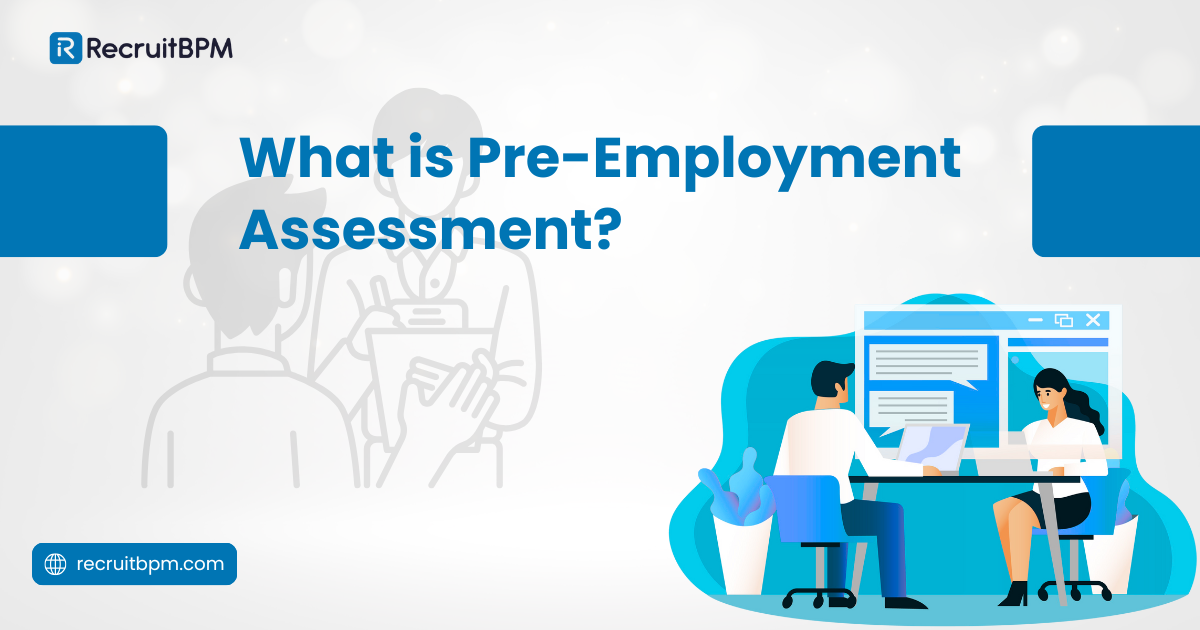Resumes look impressive. Interviews feel promising. Then your new hire struggles in the actual role. Pre-employment assessments help you avoid this costly mistake by revealing candidate capabilities before you extend offers.
Understanding Pre-Employment Assessments
A pre-employment assessment is a standardized test that evaluates a candidate’s suitability for specific roles. These tools measure skills, knowledge, personality traits, and cognitive abilities objectively.
Think of assessments as X-rays for hiring decisions. Resumes show surface-level information. Interviews reveal presentation skills. Assessments uncover actual capabilities and work-related attributes.
Organizations use these evaluations to make data-driven hiring choices. You compare candidates using consistent criteria. Subjective impressions give way to measurable results.
Pre-employment testing happens during the screening process. Many companies assess candidates before interviews. This approach filters applicants efficiently and focuses interviewer time on qualified prospects.
The tests provide insights that traditional methods miss. Can your marketing candidate actually write compelling copy? Does your developer truly understand Python? Assessments answer these questions definitively.
Valid pre-employment assessments predict job performance accurately. Research shows they outperform experience requirements and education credentials. You’re measuring actual ability rather than assumed qualifications.
Types of Pre-Employment Tests Explained
Different assessment types measure different attributes. Understanding each category helps you build comprehensive evaluation programs.
Cognitive Ability Tests measure problem-solving skills and learning capacity. These assessments evaluate critical thinking, reasoning, and information processing speed. Candidates might solve logic puzzles or analyze data sets.
Research shows cognitive ability strongly predicts job performance. These tests work especially well for mid-level and senior positions. Learning ability matters more as role complexity increases.
Personality Assessments evaluate behavioral tendencies and interpersonal styles. You discover how candidates approach work, handle stress, and interact with colleagues. These tests predict cultural fit and team compatibility.
Work-contextualized personality tests provide the most value. Questions relate specifically to workplace scenarios. Generic personality quizzes lack predictive power for job performance.
Skills Assessment Tests measure technical abilities directly. Your graphic designer completes an actual design project. Your accountant works through financial scenarios. These work samples reveal practical competency.
Skills tests eliminate resume exaggeration. Candidates demonstrate capabilities rather than claiming them. You see exactly what they can deliver.
Emotional Intelligence Tests assess relationship-building abilities and emotional awareness. High emotional intelligence correlates with leadership success and teamwork effectiveness. These tests measure empathy, self-awareness, and conflict resolution skills.
Integrity Tests evaluate honesty and rule-following tendencies. These assessments predict counterproductive work behaviors like theft, absenteeism, or safety violations. Entry-level positions benefit most from integrity testing.
Physical Ability Tests measure strength, stamina, and dexterity. Construction, manufacturing, and warehouse positions often require these assessments. You verify that candidates can handle physical job demands safely.
Job Knowledge Tests evaluate understanding of role-specific responsibilities. These work best for specialized positions requiring technical expertise. You confirm candidates possess the necessary domain knowledge.
Benefits of Pre-Employment Testing for Recruiters
Pre-employment assessments transform recruitment effectiveness. Time savings come immediately. Tests filter large applicant pools quickly without requiring a recruiter review of every resume.
Quality improvements follow naturally. You identify candidates with genuine capabilities rather than polished application materials. AI-generated resumes and cover letters make this distinction increasingly important.
Objective data reduces unconscious bias significantly. Tests evaluate job-relevant attributes consistently. Factors like educational pedigree or resume formatting become less influential. Your hiring becomes more equitable.
Interview productivity increases dramatically. Assessment results guide your questioning. Focus conversations on areas needing exploration rather than starting from scratch. You use limited interview time strategically.
Predictive accuracy strengthens hiring outcomes. Valid assessments correlate strongly with job performance. Your new hires succeed more often because you’ve measured relevant capabilities beforehand.
Cost savings accumulate over time. Bad hires are expensive through training costs, lost productivity, and replacement expenses. Assessments reduce these failures significantly.
Candidate experience improves when done well. Applicants appreciate evaluation based on abilities rather than just credentials. The process feels fair and transparent.
Legal compliance gets easier with validated assessments. Properly designed tests withstand discrimination challenges. You demonstrate job-relatedness clearly.
When to Use Pre-Employment Assessments?
Timing matters significantly for assessment effectiveness. Early-stage testing works best for screening large applicant pools. Basic cognitive and skills tests filter candidates efficiently.
High-volume hiring scenarios benefit tremendously from assessments. Retail, customer service, and warehouse positions often attract hundreds of applications. Tests narrow the field quickly.
Specialized technical roles require skills validation. Your software engineering candidates should demonstrate actual coding ability. Work sample tests reveal competency definitively.
Leadership positions warrant a comprehensive assessment. Evaluate cognitive ability, personality fit, and emotional intelligence together. Senior hires carry too much risk for guesswork.
Remote work situations increase assessment value. You can’t observe candidates in person easily. Tests provide data that video interviews might miss.
Skills-based hiring approaches depend on testing fundamentally. When you prioritize capabilities over credentials, assessments become essential evaluation tools.
Avoid assessments for roles with obvious qualifications. Licensed positions like nursing or accounting have credential requirements already. Additional testing might feel redundant.
Consider candidate volume when deciding timing. Small applicant pools might not need early screening tests. Save assessments for later hiring stages when finalist evaluation matters most.
How RecruitBPM Streamlines Assessment Integration?
RecruitBPM makes pre-employment testing seamless within your recruitment workflow. No separate platforms or manual data transfers required.
The integrated approach means assessment results live alongside candidate profiles. View test scores, work samples, and interview notes together. Make decisions with complete information easily accessible.
Customizable evaluation criteria let you weight assessment results appropriately. Some roles prioritize technical skills while others emphasize cultural fit. Configure scoring to match your requirements.
Automated workflows trigger assessments at optimal stages. Candidates receive test invitations automatically after application submission. Your team focuses on reviewing results rather than coordinating logistics.
Collaboration features enable team-based evaluation. Share assessment results with hiring managers and interview panels. Discuss findings and reach consensus efficiently.
Analytics reveal which assessments predict success best. Track the hired candidates’ performance and correlate it with their test results. Refine your assessment strategy based on actual outcomes.
The candidate experience stays professional throughout. Branded assessment invitations and clear instructions reflect well on your organization. Technical issues get resolved quickly through integrated support.
Creating Valid Pre-Employment Tests
Test validity determines whether assessments actually work. Valid tests measure attributes relevant to job performance. Invalid tests waste time and create legal risks.
Start with a thorough job analysis. Identify critical skills, knowledge, and abilities required for success. Document these requirements clearly before selecting or creating assessments.
Choose validated assessment tools from reputable providers. Look for tests backed by research and data. Avoid generic personality quizzes lacking a scientific foundation.
Pilot test assessments before full implementation. Administer tests to current successful employees. Verify that top performers score well while poor performers don’t.
Monitor adverse impact continuously. Track whether assessments disproportionately exclude protected groups. Disparate impact creates legal vulnerability even without intentional discrimination.
Update assessments as jobs evolve. Role requirements change with technology and market conditions. Review test relevance annually at a minimum.
Document validation thoroughly. Maintain records showing job-relatedness and predictive accuracy. This documentation protects against discrimination claims.
Consider combining multiple assessment types. Cognitive ability plus personality testing provides a more complete evaluation than either alone. Comprehensive assessment programs work best.
Legal Compliance in Pre-Employment Testing
Employment testing must comply with anti-discrimination laws. The Equal Employment Opportunity Commission provides clear guidelines for compliant assessment use.
Tests cannot intentionally discriminate based on protected characteristics. Race, color, sex, national origin, religion, disability, and age protections apply. Design assessments to measure job-relevant attributes only.
Disparate impact requires careful monitoring. When tests disproportionately exclude protected groups, you must justify business necessity. Show that the assessment predicts job performance validly.
Reasonable accommodations for disabilities are mandatory. Provide modified testing conditions when needed. Extra time, assistive technology, or alternative formats maintain fairness.
Consistent administration prevents discrimination claims. Every candidate takes the same test under similar conditions. Don’t make exceptions that could appear biased.
Job-relatedness must be demonstrable. Every test component should connect to actual job requirements. Avoid measuring attributes unrelated to performance.
Keep assessment content confidential. Test integrity depends on candidates not knowing the questions beforehand. Secure storage and limited access protect validity.
Document everything thoroughly. Maintain records showing validation efforts, adverse impact analyses, and business justification. Good documentation defends against legal challenges.
Conclusion
Pre-employment assessments give hiring teams powerful tools for identifying top talent. These tests reveal capabilities that resumes and interviews cannot show. Your hiring becomes more accurate, efficient, and fair.
The key lies in choosing valid assessments matched to your specific needs. Combine multiple test types for comprehensive evaluation. Integrate testing seamlessly within your recruitment workflow.
RecruitBPM’s platform makes assessment implementation straightforward. You manage testing alongside all other recruitment activities. Data-driven hiring decisions become your standard approach rather than an aspirational goal.
Start by identifying your biggest hiring challenges. Do you struggle with high turnover? Resume exaggeration? Bad cultural fits? Select assessments that address these specific issues.
Begin small and scale gradually. Test one role thoroughly before expanding. Build confidence in your assessment program through demonstrated results.
The competitive advantage grows as assessment sophistication increases. Organizations using validated testing consistently outperform those relying solely on traditional methods.
Ready to make smarter hiring decisions? Discover how RecruitBPM helps you implement effective pre-employment assessment programs.

















